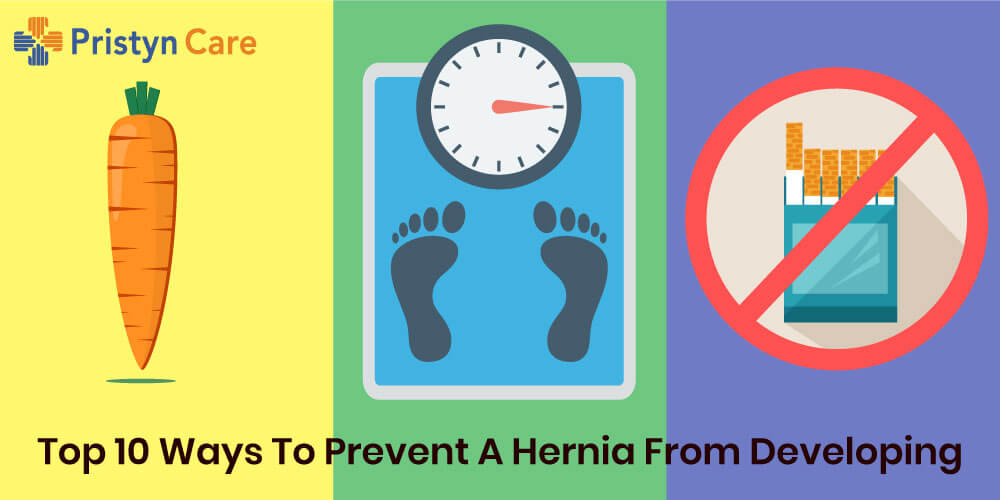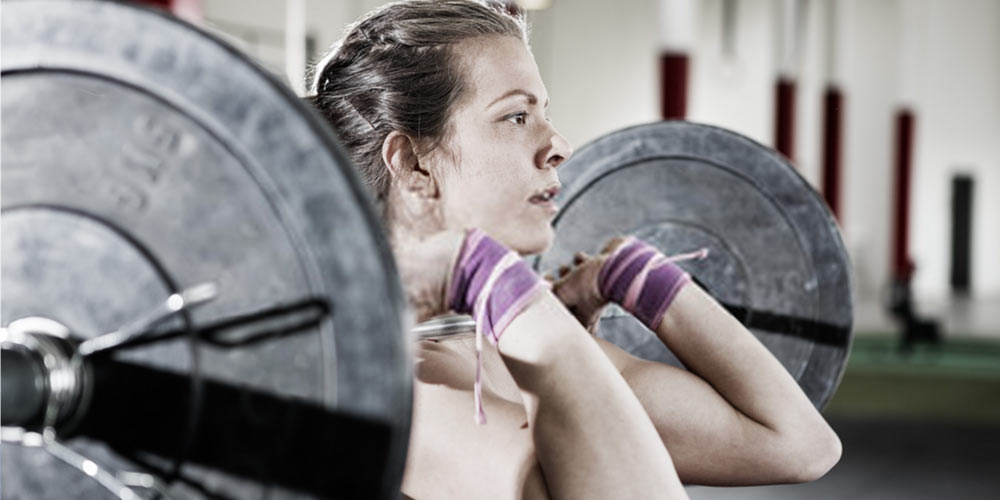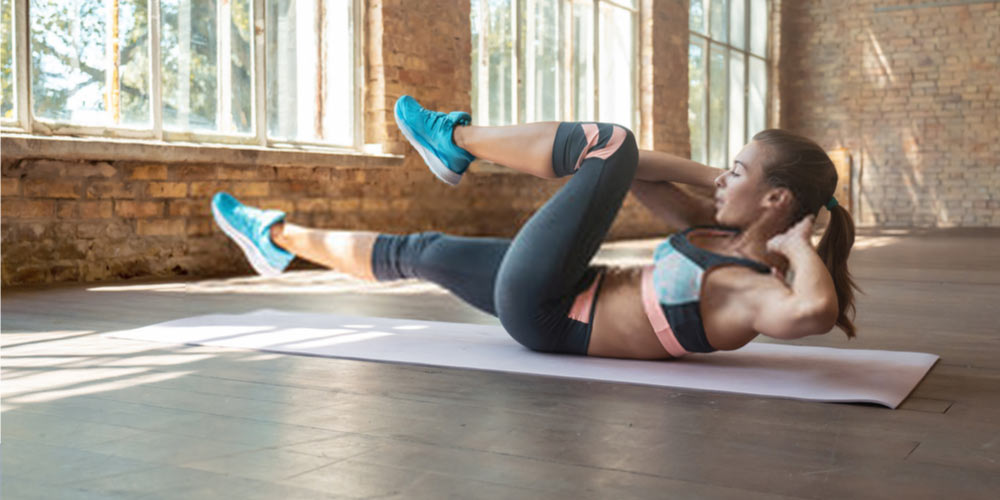
Table of Contents
Introduction
In order to prevent a hernia, one must know how it occurs. When a section of the intestine or any part of the abdominal muscles weakens, it can get pushed out from its original place. So, when more pressure is put around the weakened area the protrusion becomes worse.
Some hernias are preventable while some are not. The hernias that develop due to factors beyond your control such as prior abdominal surgery and weakening of the muscles since birth, cannot be prevented.
Each type of hernia develops due to different causes which means that the preventive measures for each kind are also different. The most common type of hernia that occurs in men is- inguinal and umbilical hernia.
Adults can reduce the risk of hernia by not putting extra pressure on the abdomen. Wondering how? Here are the top 10 tips that can help you prevent a hernia from occurring. (Also Read: Commonly Seen Hernia Symptoms in Men)
10 Ways To Prevent A Hernia
Get Fit
The risk of developing a hernia is more in overweight or obese people. This is so because of the abdominal wall that puts constant pressure from the extra weight whenever you stand or move around.
Getting into good shape is rather too difficult. It requires constant motivation and will. Start slow and then increase the intensity gradually.You can lose weight by making dietary changes and incorporating some light exercises on a daily basis. A great start to your fitness regime could be low impact exercises such as walking or biking. Then gradually shift your focus on strengthening your core muscles that can help to reduce the risk of a particular type of hernias.
Try to Cure Constipation
Chronic constipation is a risk factor of hernia. It becomes imperative to treat this problem. Foods that are rich in fiber help to regularise the bowel movement and thus, preventing constipation. Fortunately, there are some Home Remedies To Cure Constipation
Some fiber-rich foods that you should include in your everyday diet are-
-Vegetables
-Whole grains
-Nuts and seeds
-LegumesSome people need an extra dose of fiber apart from the above food types. They can try fiber supplements such as laxatives that contain psyllium. These can help to regularise and prevent excessive straining during bowel movements.
Bat an attentive eye to your daily amount of water consumption also. Drink at least 1.5-2 liters of water on a daily basis.
Maintain Good Posture While Heavy Lifting

A hernia can result due to sudden lifting of heavyweights. Practically speaking, it is not possible to completely avoid lifting heavyweights. So when you need to lift a heavy object, do it correctly.Here are a few reminders to keep in mind before lifting heavyweights-
-Tighten your abdominal muscles and keep your back straight.
-When you stand, maintain a distance between your feet and shoulder.
-Rely more on your leg muscles than the back.
-When you turn, don’t twist from the waist. Turn the whole body.Restrictions on Smoking and Drinking
To reiterate something that everybody is well aware of, smoking is injurious to health. The risk of hernias is higher among people who are active smokers. Smoking inhibits cell growth by restricting enzyme production.
Moreover, the nicotine present in cigarettes can weaken the abdominal lining that can eventually lead to protrusion of an organ from its original place. In addition to this, there can be an accumulation of toxins in the lungs that can cause a chronic cough.
Drinking alcohol on a regular basis can damage the stomach lining as well as the liver. Alcoholics are more prone to developing a hernia. Therefore, limit your smoking and alcohol consumption.
Practice Yoga and Meditation every day
Practicing yoga and meditation on a daily basis gives a boost to your health system in general. In addition to the increased flow of positive energy throughout the body, specific yoga postures cure the problem from its roots.
The best way to lower the risk of hernia is working on strengthening the weak abdominal muscles. You can try yoga asanas that involve stretching of the stomach muscles.
To get the best results, practice these ten times a day. Another added advantage of yoga is that people with past history of hernias can reduce the chances of recurring.
For people suffering from hiatal hernias, deep breathing exercises can provide some relief. Similarly to reduce the risk of inguinal and umbilical hernias, pull the abdominal muscles inside for 3 seconds and then release slowly. Some yoga postures that can help are-
-Camel Pose
-Wheel Pose
-Bow Pose
-Vajrasana
-PawanmuktasanaWear Comfortable Clothes

This might sound a little bizarre but wearing very tight clothes can cause a hernia. Wearing clothes that are too tight from the waist on a daily basis increases the risk of hernia. Avoid wearing clothes that are too tight and cause discomfort.Before Working Out, Warm Up
The body needs to be prepared before an intense workout. Warming up for a couple of minutes before your workout can decrease the risk of a hernia. Start with the low-intensity then gradually move to your exercise routine.
Reduce The Workout Intensity When Feeling Uncomfortable
Don’t push yourself too much to finish your fitness regime. Listen to your body. If you feel that the intensity of the workout is too much, then stop it immediately. Remember to rest a day each week in between your workouts. In those days, you can try some gentle yoga or go out for a leisurely walk.
Try A Low-Intensity Workout

As the main cause of developing a hernia is the weakening of muscles, it makes sense to say that strengthening the core muscles is a more right approach. You can strengthen the core muscles by exercising regularly.The right exercises prevent the muscles and tissues from getting weak. Some of the common exercises that can prevent a hernia are-
-Single leg squats
-Hip flexors
-Lateral leg lunges
-Abdominal bicycle crunchDon’t Ignore Other Health Problems
The risk of developing a hernia increases with other health issues such as an excessive gaining of weight, chronic coughing, sneezing or constipation. All these illnesses can cause excessive strain that increases the risk of developing a hernia.
Hence, if you have developed any of these chronic conditions, then get treatment immediately. These are common symptoms that can indicate a far more serious health issue. Get in touch with a medical professional immediately.
(Also Read: Things To Do and Avoid During Hernia)

What Are The Risk Factors of Developing A Hernia?
The tissues in the abdomen can also get weak due to some other factors that are beyond an individual’s control. These factors contribute to the risk of developing a hernia. Some of the uncontrollable reasons that result in the occurrence of a hernia are-
- Aging
- Chronic cough
- Chronic Obstructive Pulmonary Disorder
- Present since birth when the baby is growing inside the womb
- Injury
- Previous surgery
- Chronic constipation
- Being overweight or obese
- Performing strenous activities or lifting heavyweights
- Pregnancy
- Suffering from ascites
What To Do When a Hernia Develops?
It’s a possibility that even after maintaining a healthy lifestyle as well as following a proper diet plan, a hernia develops. So the question pops in the mind, “What to do in when a hernia develops?”. Unfortunately, there’s little you can do when a hernia develops. In addition to watchful waiting, some doctors recommend some tips that prevent the hernia from getting worse.
However, delaying the treatment of a hernia is not prudent. When a hernia is left untreated for a long period of time, it can lead to severe complications which can be fatal. Hence, without any further delay, visit a general surgeon for proper diagnosis. After a thorough physical examination and asking questions pertaining to medical history, the doctor prescribes undergoing laparoscopic hernia repair. The success rate of laparoscopic hernia repair is very high as compared to other conventional methods.
Conclusion
Sometimes even after taking proper precautions, the person can get affected. A person with hernia experiences pressure around the herniated area, a cough or heartburn. In such times, it is better to get properly diagnosed by a general surgeon. Are you experiencing such symptoms? Give us a call on the above number to know more!
Also Read:










